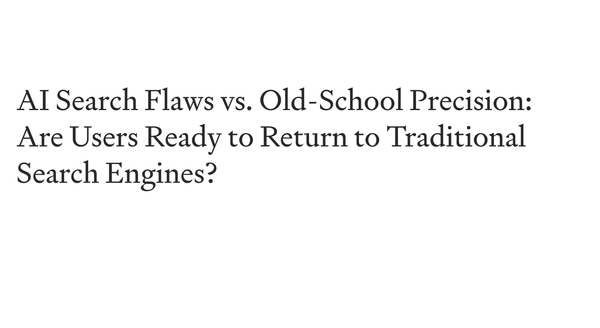Google Dropped an AI-Powered Search Feature, What You Should Know, Did it Kill SEO?
Table of Content
Let me start by saying—I’m kind of obsessed with how tech keeps evolving. Every time I think we’ve hit peak innovation, something new comes along to blow my mind. This time, it’s Google. Yes, the Google, the king of search engines, has just rolled out a beta version of its AI-powered search feature called AI Mode, and honestly? It’s pretty slick.
So here’s the deal: instead of bombarding you with endless lists of blue links when you search for something (you know, the classic Google vibe), this new feature gives you a concise summary generated by AI. Think of it as having a super-smart assistant who scans all the web pages for you and then breaks down what you need to know in simple terms. And guess what? It even includes links to the original sources so you can dive deeper if you want. Pretty cool, right?

How Did We Get Here?
Okay, full disclosure—I’ve been using ChatGPT Search, alongside Bing since OpenAI launched it back in October 2024. If you haven’t tried it yet, let me tell you, it’s amazing. Instead of sifting through dozens of websites to find answers, ChatGPT Search gives you a neat little summary with clickable links to the source material. It’s saved me tons of time, especially when I’m looking for quick facts or trying to understand complex topics.
But now, Google is stepping up its game. As someone who uses Google daily—like, multiple times a day—I was thrilled to hear they’re finally integrating advanced AI into their search engine. They didn’t just copy OpenAI’s idea; they added their own twist. For example, AI Mode runs on a custom version of Gemini 2.0, which Google claims has some next-level reasoning capabilities. That means it can handle more complicated questions better than ever before.
For instance, say you’re researching “how quantum computing could impact cybersecurity.” Normally, I’d have to open five different tabs, skim through articles, and try to piece everything together myself. But with AI Mode, I get a clean, easy-to-read summary that explains the key points—and still lets me explore further if I want. Less clutter, more clarity. Sign me up!
Who Can Use It?
Right now, AI Mode is only available to subscribers of Google One AI Premium, which costs $20/month. Honestly, that feels a bit steep for some people, but considering everything you get, it might be worth it. Along with AI Mode, the subscription includes perks like Gemini Advanced (their top-tier AI model), smart search responses, integration with Gmail and Docs, 2TB of cloud storage, and enhanced features for Google Calendar and Meet. So yeah, it’s not just about search—it’s a whole productivity package.
To access AI Mode, you just go to your regular search results page and click on the “AI Mode” option next to filters like Images or Maps. Super straightforward. Once you’re in, you can type your query like you normally would, and boom—the AI-generated summary pops up. It’s almost like chatting with a really knowledgeable friend who happens to know everything.

Why Do I Find This So Cool?
No more scrolling through irrelevant results or getting lost in rabbit holes.
As someone who spends hours online every week researching random stuff (from DIY home repairs to obscure historical events), I love tools that make life easier. Here’s why I think AI Mode is such a big deal:
- Time-Saving: Let’s face it—we’re all busy. Whether you’re working on a project, studying for exams, or just satisfying your curiosity, AI Mode cuts straight to the chase.
- Better Understanding: Sometimes, raw information isn’t enough. You need context. AI Mode doesn’t just spit out data; it organizes it in a way that makes sense. Plus, the summaries are written in plain language, so even if you’re not an expert, you’ll still understand.
- Trustworthy Sources: One thing I appreciate is that the summaries come with direct links to credible sources. In today’s world of misinformation, knowing where your info comes from is crucial. With AI Mode, you’re not just getting answers—you’re getting answers backed by reliable websites and sources.
- Customization: Since it’s powered by Gemini 2.0, the system seems smarter at understanding nuanced queries. For example, when I asked about “best budget laptops for graphic design,” it didn’t just list specs—it actually explained why certain models were better suited for creative work. That level of detail is impressive.

The Bigger Picture
Of course, this move by Google didn’t happen in a vacuum. OpenAI set the bar high with ChatGPT Search, and Google clearly felt the pressure to keep up. Competition drives innovation, and as a user, I’m loving the results. Both companies are pushing boundaries, and we’re reaping the benefits.

That said, I do wonder how small businesses and content creators will fare in this new era of AI-driven search. Will fewer people visit individual websites if they can get all the info they need from a summary? Or will these summaries actually drive more traffic by highlighting relevant sources? Time will tell.
Final Thoughts
At the end of the day, I’m excited about AI Mode because it solves real problems. It’s faster, smarter, and more intuitive than traditional search methods. Sure, it’s still in beta, and there’s room for improvement (like maybe making it cheaper or more accessible). But overall, it’s a step in the right direction.
If you’re someone who values efficiency and accuracy, I’d recommend giving it a shot—if you can swing the $20/month fee. Personally, I’m looking forward to seeing how this evolves over the next few years. Who knows? Maybe one day, searching the web will feel less like detective work and more like having a conversation with a genius buddy. And honestly, that sounds pretty awesome to me.















